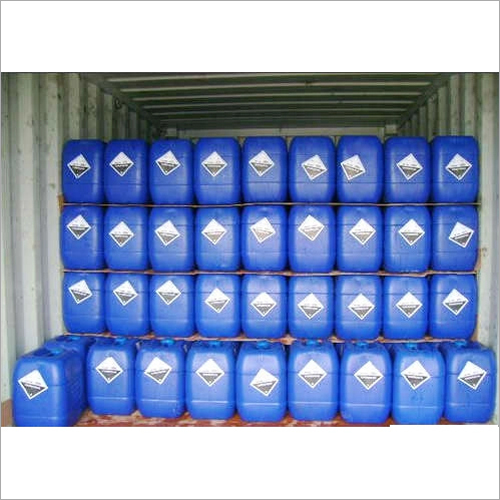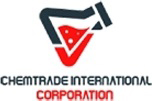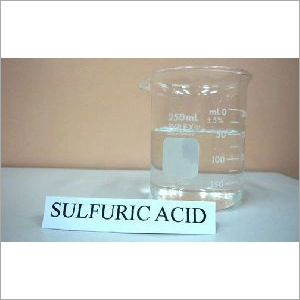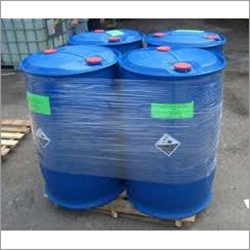
Sulphuric Acid
Product Details:
- Molecular Formula HSO
- Molecular Weight 98.079 Grams (g)
- Boiling point 337 C
- Classification Inorganic Acids
- Grade Industrial Grade
- Application It has a wide range of end applications, including in domestic acidic drain cleaners, as an electrolyte in lead-acid batteries, in dehydrating a compound, and in various cleaning agents. Sulfuric acid can be obtained by dissolving sulfur trioxide in water.
- Appearance Colourless viscous liquid
- Click to View more
X
Sulphuric Acid Price and Quantity
- 20 Ton
Sulphuric Acid Specifications
- 7664-93-9
- Inorganic Acids
- 98.079 Grams (g)
- It has a wide range of end applications, including in domestic acidic drain cleaners, as an electrolyte in lead-acid batteries, in dehydrating a compound, and in various cleaning agents. Sulfuric acid can be obtained by dissolving sulfur trioxide in water.
- 10.31 C
- 1.83 Gram per cubic centimeter(g/cm3)
- Colourless viscous liquid
- HSO
- Industrial Grade
- 337 C
- Hydrogen sulfate
Sulphuric Acid Trade Information
- 10 Days
Product Description
Sulphuric Acid is the by-product of the reaction between water and sulfur trioxide. The chamber method, which involves combining sulfur dioxide and oxygen chemically, produces sulfur trioxide. Because of its great affinity for water, the pure chemical does not occur in nature. For various uses, it is provided at various concentrations. Sulphuric Acid is also known as hydrogen sulfate or oil of vitriol. In terms of commerce, it is one of the most significant chemicals. This is very effective and safe to use.
Sulphuric Acid Properties:
1. Chemical Formula and Composition: Sulfuric acid has the chemical formula H2SO4, indicating that it consists of two hydrogen (H) atoms, one sulfur (S) atom, and four oxygen (O) atoms.
2. Physical State: Sulfuric acid is typically a colorless, oily liquid at room temperature. It has no characteristic odor, but it can release fumes that are highly irritating and potentially harmful upon contact with water.
3. Strength and Concentration: Sulfuric acid is a strong acid, meaning that it dissociates completely in water to produce a high concentration of hydrogen ions (H+). Concentrated sulfuric acid solutions are extremely corrosive and can cause severe burns upon contact with skin.
4. Hygroscopic Nature: Sulfuric acid is highly hygroscopic, which means it readily absorbs water vapor from the surrounding air. This property allows it to be used as a drying agent in various applications.
5. Acidic Properties: Sulfuric acid is a powerful acid and can react with a wide range of substances, often leading to the release of heat and potentially dangerous fumes. It can react with metals, bases, and other compounds.
6. Dehydrating Agent: Sulfuric acid has strong dehydrating properties, meaning it can remove water molecules from other compounds. This property is often utilized in industrial processes, such as in the production of certain chemicals and in the dehydration of sugar to form carbon.
7. Dissociation in Water: When sulfuric acid is dissolved in water, it dissociates into hydrogen ions and sulfate ions.
8. Boiling and Freezing Points: Sulfuric acid has a relatively high boiling point of around 337 degrees Celsius (639 degrees Fahrenheit) and a freezing point of about 10 degrees Celsius (50 degrees Fahrenheit).
9. Density: The density of sulfuric acid varies with concentration. For example, 98% concentrated sulfuric acid has a density of around 1.84 g/cm3.
10. Corrosive Nature: Sulfuric acid is highly corrosive to many materials, including metals, organic materials, and some plastics. It can cause damage to equipment and structures if not handled with care.
11. Industrial Applications: Sulfuric acid is used in various industries, such as in the production of fertilizers (e.g., ammonium sulfate and superphosphate), detergents, pigments, explosives, and other chemicals. It is also utilized in oil refining and as an electrolyte in lead-acid batteries.
12. Environmental Impact: Sulfuric acid is a major component of acid rain, which can have harmful effects on the environment, including damaging vegetation, aquatic ecosystems, and infrastructure.
Applications of Sulphuric Acid:
1. Manufacturing of Chemicals: Sulfuric acid is a crucial raw material in the production of a wide range of chemicals, including fertilizers, detergents, pigments, dyes, and synthetic resins.
2. Fertilizer Production: Sulfuric acid is used to produce phosphoric acid, which is then used to make phosphate fertilizers like ammonium phosphate and superphosphate. These fertilizers provide essential nutrients to plants for improved growth and yield.
3. Petroleum Refining: Sulfuric acid is employed in the petroleum industry for various purposes, including the alkylation process, which combines small hydrocarbons to produce high-octane gasoline components.
4. Battery Manufacturing: Sulfuric acid is a key component of lead-acid batteries commonly used in automotive and industrial applications. It serves as the electrolyte that facilitates the chemical reactions within the battery.
5. Dyeing and Textile Industry: Sulfuric acid is used in the production of synthetic dyes and in textile processing, such as in the removal of impurities and in the dyeing of fibers.
6. Explosives Production: Sulfuric acid is used in the production of certain explosives, such as nitroglycerin and TNT (trinitrotoluene).
7. Mineral Processing: It is used in mining operations for leaching metals from ores, including copper, zinc, and nickel.
8. Water Treatment: Sulfuric acid is employed for pH adjustment and neutralization in water treatment processes to control the acidity or alkalinity of water.
9. Cleaning and Descaling: Sulfuric acid is used for cleaning and descaling metal surfaces, such as removing rust and scale from steel and iron equipment.
10. Dehydrating Agent: Sulfuric acid's strong dehydrating properties are utilized in various applications, including the removal of water from gases and liquids, as well as in the dehydration of certain organic compounds.
11. Pulp and Paper Industry: Sulfuric acid is used in the production of pulp and paper to break down wood fibers and in bleaching processes.
12. Synthesis of Chemical Compounds: Sulfuric acid is used in the synthesis of various chemicals, including hydrochloric acid, nitric acid, and synthetic polymers.
13. Food Processing: In the food industry, sulfuric acid is used for various purposes, such as in the processing of beet sugar and in the preparation of certain food additives.
14. Pharmaceuticals: Sulfuric acid is employed in the synthesis of pharmaceutical intermediates and in various drug manufacturing processes.
15. Laboratory and Analytical Chemistry: Sulfuric acid is commonly used as a reagent and solvent in laboratory experiments and analytical chemistry procedures.
FAQ:
1. What is sulfuric acid?
Ans: Sulfuric acid (H2SO4) is a strong, highly corrosive, and hygroscopic acid composed of hydrogen, sulfur, and oxygen atoms.
2. What is the common name for sulfuric acid?
Ans: Sulfuric acid is often referred to simply as "battery acid" or "oil of vitriol."
3. What is the pH of sulfuric acid?
Ans: Sulfuric acid is a strong acid and has a very low pH, typically ranging from around -1 to 0 for concentrated solutions.
4. What are the uses of sulfuric acid?
Ans: Sulfuric acid is used in various industries for manufacturing chemicals, fertilizers, detergents, and more. It is also used in petroleum refining, battery production, dyeing, explosives, and water treatment.
5. How is sulfuric acid produced?
Ans: Sulfuric acid is produced through the contact process, which involves oxidizing sulfur dioxide (SO2) to sulfur trioxide (SO3) and then combining SO3 with water to form sulfuric acid.
6. Is sulfuric acid dangerous to handle?
Ans: Yes, sulfuric acid is highly corrosive and can cause severe burns upon contact with skin. Proper safety precautions and protective equipment are essential when handling sulfuric acid.
7. Can sulfuric acid dissolve metals?
Ans: Yes, sulfuric acid can react with and dissolve certain metals, especially reactive metals like aluminum and zinc, producing hydrogen gas and metal sulfates.
8. What are the environmental effects of sulfuric acid?
Ans: Sulfuric acid is a major component of acid rain, which can harm vegetation, aquatic life, and infrastructure. Acid rain forms when sulfur dioxide and nitrogen oxides are released into the atmosphere and react with water vapor.
9. Can sulfuric acid dehydrate substances?
Ans: Yes, sulfuric acid is a strong dehydrating agent and can remove water molecules from other substances, including organic compounds and gases.
10. Is sulfuric acid used in batteries?
Ans: Yes, sulfuric acid is commonly used as an electrolyte in lead-acid batteries, such as those used in automobiles and uninterruptible power supplies (UPS).
11. What safety precautions should be taken when using sulfuric acid?
Ans: Safety precautions include wearing protective clothing, gloves, and eyewear, working in a well-ventilated area, avoiding inhalation of fumes, and having access to emergency equipment like eyewash stations and safety showers.
12. Can sulfuric acid be transported safely?
Ans: Sulfuric acid should be transported in appropriate containers that are resistant to its corrosive properties. Transport regulations and guidelines must be followed to ensure safe transportation.
13. Can sulfuric acid react with organic materials?
Ans: Yes, sulfuric acid can react with many organic materials, often leading to carbonization, charring, or other chemical changes.
Enter Buying Requirement Details
Other Products in 'Industrial Acid' category
 |
Chemtrade International Corporation
All Rights Reserved.(Terms of Use) Developed and Managed by Infocom Network Private Limited. |

 English
English Spanish
Spanish French
French German
German Italian
Italian Chinese (Simplified)
Chinese (Simplified) Japanese
Japanese Korean
Korean Arabic
Arabic Portuguese
Portuguese
